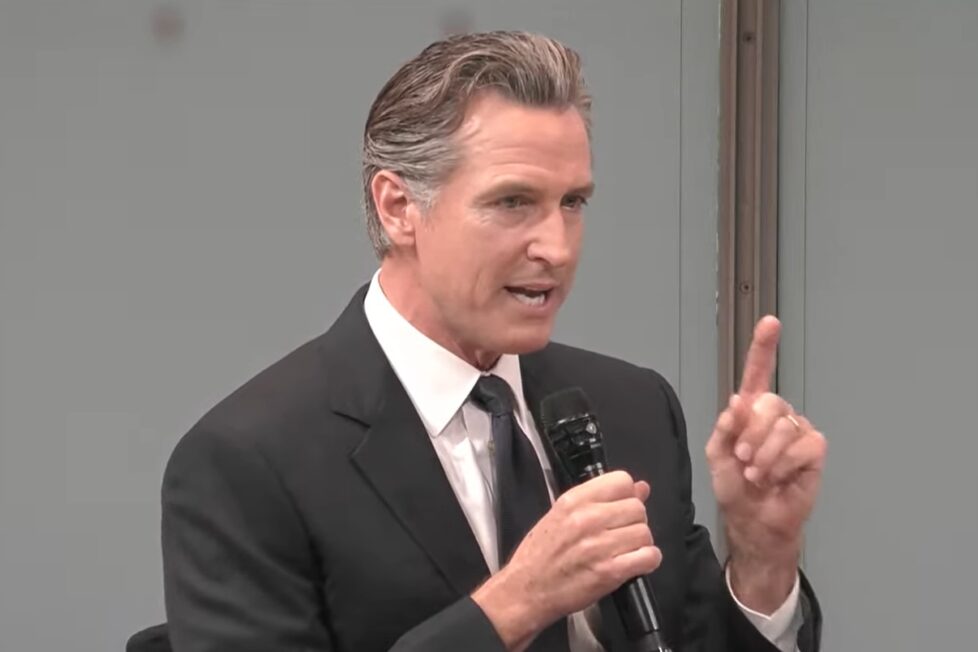California Governor Commits to Sign Climate Disclosure Bills into Law

California Governor Gavin Newsom announced on Sunday that he plans to sign two new landmark climate-related disclosure bills into law, which will require most large companies in the U.S. to disclose their full value chain emissions, as well as requiring companies to report on their climate-related financial risks and adaptation measures.
Both bills, SB 253, the “Climate Corporate Data Accountability Act” and SB-261, “Greenhouse gases: climate-related financial risk,” passed in the California Assembly last week, advancing the bills to the Governor’s desk, who has until October 14 to sign the bills.
Asked at a Climate Week NY event on Sunday if he intends to sign the bills, Newsom highlighted California’s leadership over the past several decades on climate-related legislation, including introducing the U.S.’ first cap and trade program and tailpipe emissions requirements, introducing low carbon fuel standards, and requiring sales of only alternative fuel cars in the state by 2035.
Newsom continued:
“Would I cede that leadership by having a response that is anything but ‘of course I will sign that bill?’
“No, I would not. Of course I’m going to sign those bills, and California will continue to maintain that leadership.”
The Governor added, however, that there remains some “modest cleanup on some little language” in the bills before they are signed.
Newsom noted that SB 253, requiring $1 billion+ revenue companies to disclose greenhouse gas emissions will apply to more than 5,300 businesses, including multinationals, and “some of the most well-known businesses in the world.” He added that several large companies have recently indicated their support for the bills, including Apple and Salesforce.
As passed in the Assembly, SB 253 would require companies with revenues greater than $1 billion that do business in California to report annually on their emissions from all scopes, including direct emissions (Scope 1), emissions from purchase and use of electricity (Scope 2), and indirect emissions, including those associated with supply chains, business travel, employee commuting, procurement, waste, and water usage (Scope 3).
Disclosure obligations would begin in 2026 for Scope 1 and 2 emissions, and in 2027 for Scope 3 emissions, with measurement and reporting to be performed according to the Greenhouse Gas Protocol standards. The law would also require companies to obtain third party assurance for their emissions reporting, starting with a limited assurance level beginning in 2026 for Scope 1 and 2 emissions, and at a more stringent reasonable assurance level in 2030, and at a limited assurance level for Scope 3 in 2030.
SB 261 applies to U.S. companies that do business in California and with revenues greater that $500 million to prepare a report disclosing their climate-related financial risk, in accordance with the TCFD framework, as well as measures to reduce and adapt to that risk. Prior to approval in the Assembly, the bill was amended to move the date of first disclosures to 2026 from 2024, and to require reporting every two years instead of annually.
The new laws would introduce the first major mandatory climate-related reporting obligations for many U.S. companies, although there are others likely to apply to U.S. companies as well. The SEC is preparing the final version of its own climate-related disclosure rules for U.S. companies, following the release of an initial proposal in March 2022. The California law would go farther in some ways than the proposed SEC rules, applying to all large companies, as opposed to only public companies, and including all Scope 3 emissions. Many U.S. companies will also have to comply with the EU’s Corporate Sustainability Reporting Directive (CSRD), which includes mandatory climate and sustainability-related reporting obligations for large companies on doing business in Europe.
Following the Governor’s announcement, California Senator Scott Wiener, who introduced SB 253 earlier this year, said:
“In announcing he will sign SB 253, Governor Newsom is reaffirming California’s global climate leadership. These carbon disclosures are a simple but intensely powerful driver of decarbonization. When business leaders, investors, consumers and analysts have full visibility into large corporations’ carbon emissions, they have the tools and incentives to turbocharge their decarbonization efforts.”
Sustainability-focused nonprofit Ceres, who had co-sponsored the bills, also welcomed the announcement. In a statement following Newsom’s remarks, Ceres President and CEO Mindy Lubber said:
“In so many ways, California has been a leader in the nation and around the world by pioneering the bold climate and energy policies necessary to confront the climate crisis and capitalize on the massive economic opportunity in the clean energy transition. Now, the state is poised to set another leading standard to increase corporate transparency and help to mitigate financial and climate risk.”